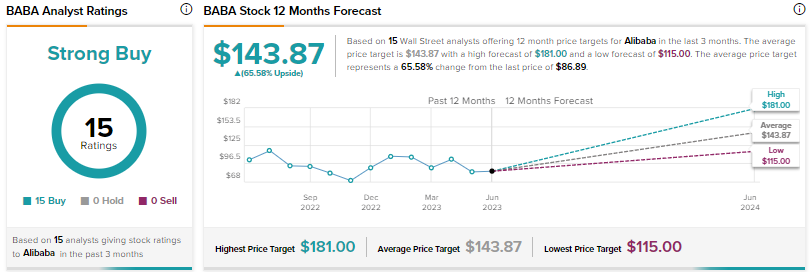China, the world’s second-largest economy, is struggling to regain its footing and bounce back strongly from the COVID-induced slump. Even after the reopening of the economy, many Chinese companies continue to see weak revenue growth rates due to an uncertain macro backdrop and a rise in youth unemployment. Also, investors are worried about the growing U.S.-China tensions. Nonetheless, Wall Street has a bullish outlook on several Chinese stocks. We used TipRanks’ Stock Comparison Tool to place Alibaba (NYSE:BABA), JD.com (NASDAQ:JD), and Nio (NYSE:NIO) against each other to pick the Chinese stock that could offer the best returns.

Alibaba (NYSE:BABA)
E-commerce giant Alibaba has been under pressure over recent quarters due to slower-than-anticipated recovery since reopening, regulatory issues, and intense competition. Nevertheless, the company’s decision to split its massive business into six new groups has sparked hopes of revival and is expected to drive shareholder value.
Last month, Alibaba announced its plans to spin off its cloud division as a newly listed company. This week, the company announced that Daniel Zhang will relinquish his role as group CEO and Chairman to focus on the cloud division. Joseph Tsai, group executive Vice Chairman, will succeed Zhang as group Chairman, while Eddie Wu, current Chairman of Taobao and Tmall, will assume the role of the group CEO. Overall, management shake-up and streamlining efforts are expected to drive long-term growth.
Is Baba a Buy, Sell, or Hold?
Reacting to the announcement, Goldman Sachs analyst James Lee said that the decision reflects improving corporate governance, with a separation of Chairman and CEO positions between the group and subsidiaries.
Further, the analyst noted that some subsidiaries have started the spin-off process “so they could be on a faster track to a public listing.” He added that the new structure unlocks the value of business units and provides a competitive advantage to each business unit. Lee maintained a Buy rating on Alibaba with a price target of $145.
Wall Street’s Strong Buy consensus rating on BABA stock is based on 15 unanimous Buys. The average price target of $143.87 implies about 66% upside. Shares are down 1.4% year-to-date.

JD.Com (NASDAQ:JD)
JD.Com’s revenue grew 1.4% in the first quarter, fueled by robust growth in its services business. The company’s high-margin services business and its efforts to streamline operations and optimize its product portfolio helped generate adjusted net income per ADS (American Depositary Share) of RMB 4.76, up from RMB 2.53 in the prior-year quarter.
While the Q1 revenue exceeded market expectations, it marked the slowest pace of growth for JD.Com amid difficult macro conditions and rising competition. To revive its sales, the company launched a massive RMB 10 billion discount campaign that aims to attract more customers through wider price ranges and product categories.
JD is optimistic about the road ahead, with a focus on growth in lower-tier markets, advancements in technology and services, international expansion, and higher efficiency in operations. The company recently announced that it aims to create seven listed firms with a market value of at least $14 billion apiece.
Is JD Stock a Buy or Sell?
Following the results in May, Susquehanna analyst Shyam Patil lowered the firm’s price target for JD.com to $40 from $45 and maintained a Hold rating. The analyst said the top-line growth was muted, though fine. He also highlighted management’s cost discipline.
JD scores a Strong Buy consensus rating based on 11 Buys and three Holds. At $59.50, the average price target implies nearly 63% upside. Shares have plunged about 35% so far in 2023.

NIO (NYSE:NIO)
Earlier this month, Chinese electric vehicle (EV) maker Nio reported a larger-than-anticipated loss for the first quarter. The company’s revenue growth of 7.7% also fell short of expectations. Supply chain issues, macro challenges, and intense competition have impacted Nio’s performance over the recent quarters.
Nio expects its Q2 deliveries in the range of 23,000 to 25,000, which reflects a decline of about 8.2% to 0.2% year-over-year. The outlook also indicates a significant fall compared to Q1 deliveries of 31,041. However, the company is optimistic about better times ahead and is ramping up the production of its new models, including the ES6.
Nio recently slashed prices by RMB 30,000 across all its vehicle models to stay competitive in the Chinese EV market. The company has also decided to end free battery-swapping services to new buyers.
This week, Nio announced a $738.5 million strategic investment from CYVN Holdings. The investment is expected to bolster Nio’s balance sheet, accelerate business growth, and expand its international business.
What is the Prediction for NIO Stock?
Reacting to the news of capital injection, Morgan Stanley analyst Tim Hsiao reiterated a Buy rating on Nio stock with a price target of $12, as he feels that the investment from the strategic investor in Abu Dhabi should ease investors’ concern about the company’s short-term cash flow.
However, he contended that more meaningful improvement in cash flow still depends on better volumes in the second half of 2023. He believes that strong order momentum for the new ES6 SUV and ET5 Touring electric wagon in June lays a more “favorable” foundation.
With seven Buys and four Holds, Nio earns Wall Street’s Moderate Buy consensus rating. The average price target of $10.33 implies about 16% upside. Shares are down nearly 9% year-to-date.

Conclusion
Despite the uncertainty around economic recovery in China, Wall Street is bullish on the three stocks discussed above. Currently, they see higher upside in Alibaba than JD.Com and Nio. Wall Street analysts are highly bullish on Alibaba’s growth potential, given the company’s restructuring efforts, dominance in e-commerce, and investments in generative artificial intelligence (AI).
















